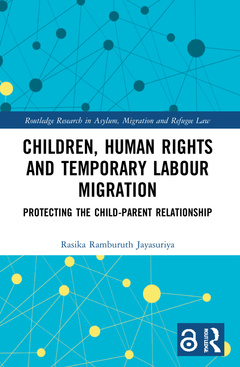Children, Human Rights and Temporary Labour Migration Protecting the Child-Parent Relationship Routledge Research in Asylum, Migration and Refugee Law Series
Auteur : Jayasuriya Rasika

This book focuses on the neglected yet critical issue of how the global migration of millions of parents as low-waged migrant workers impacts the rights of their children under international human rights law.
The work provides a systematic analysis and critique of how the restrictive features of policies governing temporary labour migration interfere with provisions of the Convention on the Rights of the Child that protect the child-parent relationship and parental role in children?s lives. Combining social and legal research, it identifies both potential harms to children?s well-being caused by prolonged child-parent separation and State duties to protect this relationship, which is deliberately disrupted by temporary labour migration policies. The book boldly argues that States benefitting from the labour of migrant workers share responsibility under international human rights law to mitigate harms to the children of these workers, including by supporting effective measures to maintain transnational child-parent relationships. It identifies measures to incorporate children?s best interests into temporary labour migration policies, offering ways to reduce interferences with children?s family rights.
This book fills a gap that emerges at the intersection of child rights studies, migration research and existing literature on the purported nexus between labour migration and international development. It will be a valuable resource for academics, researchers and policymakers working in these areas.
The Open Access version of this book, available at http://www.taylorfrancis.com/books/e/9781003028000, has been made available under a Creative Commons Attribution-Non Commercial-No Derivatives 4.0 license
Introduction
1. Understanding the landscape: TLM in context
2. Normative and conceptual framework
3. General legal principles
4. Article 27: Is TLM an appropriate form of assistance to parents to meet their children’s development needs?
5. Articles 10(2) and 5: Can TLM policies better support the maintenance of transnational child-parent relationships?
6. Article 16: Do TLM policies generate arbitrary interferences with children’s family life?
7. Articles 18 and 7: State obligations to protect the child-parent relationship: Securing a place for children’s rights in TLM
Conclusion
Appendix I: Summary of policy measures to reduce interferences caused by TLM with CRC provisions and general legal principles that protect the child-parent relationship in international human rights law
Appendix II: Breakdown of key informants
Rasika Ramburuth Jayasuriya has worked for two decades across government, multilateral and civil society organisations on policy issues related to migration and children’s rights. She has a PhD from the University of Melbourne’s Law School and was a doctoral associate at the University of Toronto. Rasika has held positions as a migration policy specialist at UNICEF and IOM-UN Migration in Geneva and as a senior policy officer at the Department of Premier and Cabinet in Victoria, Australia. She is lead author of ‘The Migration of Women Domestic Workers from Sri Lanka: Protecting the Rights of Children Left Behind’ (2015).
Date de parution : 01-2023
15.6x23.4 cm
Date de parution : 06-2021
15.6x23.4 cm
Thèmes de Children, Human Rights and Temporary Labour Migration :
Mots-clés :
CRC Committee; Child Parent Relationship; CRC Right; Child Parent Separation; UNICEF Study; UK Supreme Court; MLO; Temporary Migration Status; CMW; CRC Provision; Children’s Psychosocial Development; Temporary Labour Migration; Parental Migration; CRC Obligation; Children’s Rights; Children’s Family Life; ESC Right; York Declaration; Migration Policy Discourse; Maastricht Principles; Family Accompaniment; Fundamental Group Unit; Temporary Foreign Worker Program; ASEAN Consensus; Alternative Caregivers



